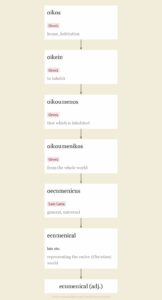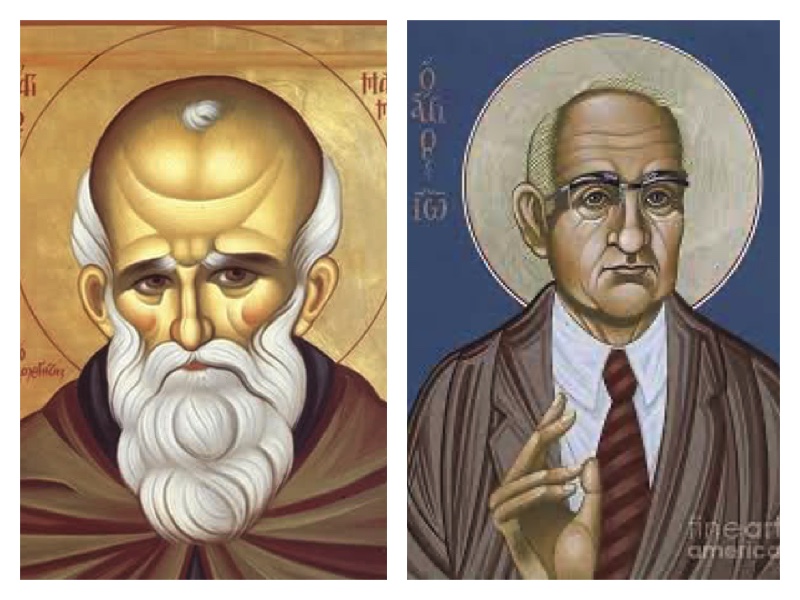Top Left: An icon of St. Maximus the Confessor, a 7th century Greek monk loyal to Rome. Top Right: An “icon” of Fr. Hans Urs Von Balthasar SJ, a Jesuit of the 20th century.
Ecumenical for the first thousand years of Christianity was an adjective to describe dogmatic meetings of orthodox bishops who cared about accurately defining the Catholic Faith. New Advent has a good definition: “Ecumenical Councils are those to which the bishops, and others entitled to vote, are convoked from the whole world (oikoumene) under the presidency of the pope or his legates, and the decrees of which, having received papal confirmation, bind all Christians.” All 21 ecumenical councils (both dogmatic and “pastoral”) are listed here.
Notice above that there have been 20 dogmatic ecumenical councils and apparently only one “pastoral ecumenical council” called “Vatican II.” (Never before had a “pastoral council” be convoked by a Pope before the 1960s.) The first 20 dogmatic councils contain infallible definitions. Not so in regards to Vatican II, for even Pope John XXIII wrote of the newest Council: “There will be no infallible definitions. All that was done by former Councils. That is enough.”—Gaudet Mater Ecclesia, 11 October 1962. Also, Pope Paul VI wrote of Vatican II: “The magisterium of the Church did not wish to pronounce itself under the form of extraordinary dogmatic pronouncements…. ”—Discourse on the closing of Vatican II, 7 December 1965.
How did the ancient saints like St. Maximus the Confessor define the word ecumenism? Ecumenism comes from the Greek infinitive oikein meaning “to inhabit.” The participle is oikemenos which came to mean “to inhabit the whole house.” Which house? The early Church held this to be all Catholic and Orthodox Bishops speaking in union together in what came to be ecumenical councils. (Notice this definition came about long before the Great Schism of East and West in 1054.) An ecumenical council in the early Church included the Pope and the bishops of East and West to hammer-out doctrine and brush-aside heresy (not create confusion via ambiguity.) The dogmatic decisions coming from these ecumenical councils (eg the Councils of Constantinople) are considered infallible. These councils are part of the ordinary magisterium. Saints like St. Maximus the Confessor (top left) had his tongue cut out by heretics for speaking the truth of the two natures of Christ that would soon be defined (greatly due to his teaching and suffering) at the Council of Chalcedon in 451. Obviously, if his tongue would be cut out for this, St. Maximus the Confessor believed that holding to orthodox belief on this would affect one’s salvation. It truly was a matter of heaven and hell for these orthodox bishops of East and West that their flock hold to that ancient faith that was one, holy, Catholic and apostolic.

From etymonline.org
On the other hand, the new definition of ecumenism is found implicity in the document of Vatican II called Nostra Aetate: From ancient times down to the present, there is found among various peoples a certain perception of that hidden power which hovers over the course of things and over the events of human history; at times some indeed have come to the recognition of a Supreme Being, or even of a Father. This perception and recognition penetrates their lives with a profound religious sense. Religions, however, that are bound up with an advanced culture have struggled to answer the same questions by means of more refined concepts and a more developed language. Thus in Hinduism, men contemplate the divine mystery and express it through an inexhaustible abundance of myths and through searching philosophical inquiry. They seek freedom from the anguish of our human condition either through ascetical practices or profound meditation or a flight to God with love and trust. Again, Buddhism, in its various forms, realizes the radical insufficiency of this changeable world; it teaches a way by which men, in a devout and confident spirit, may be able either to acquire the state of perfect liberation, or attain, by their own efforts or through higher help, supreme illumination.—Nostra Aetate #2
You will not find the word ecumenical in Nostra Aetate, but it is implied above that being Hindu or Buddhist will not negatively affect one’s salvation. Bishop Barron (an adept apologist for the documents of Vatican II) was asked in 2018 by Ben Shapiro several questions including the following:
Shapiro : “I’m a Jew. I follow the Law. Can I go to Heaven”?
Barron: “Yes…the Catholic view…go back to the 2nd Vatican Council says it very clearly….I mean Christ is the privileged route to salvation…that is the privileged route….However, Vatican II clearly teaches that someone outside the explicitly Christian faith can be saved….it might be received according to your conscience….Now that doesn’t conduce to a complete relativism…We would still say the privileged route and the route that God has offered to humanity is the route of His Son…but no, you can be saved..uh…even Vatican II says that an Atheist of good will can be saved…..because in following his conscience…John Henry Newman said the conscience is the aboriginal Vicar of Christ in the soul…it is in fact the voice of Christ…when I follow my conscience, I’m following Him..whether I know it explicitly or not…so even the atheist of good will can be saved”.
Notice that Bishop Barron (clearly not considered “a liberal” by most of the American Catholic Church) asserts above that “even the atheist of good will can be saved.” So, while the modern definition of ecumenism may be debated de jure (and, yes, I’m aware that most in Bishop Barron’s camp would say it only refers to Catholics dialoguing with Protestants, not Jews) it has de facto come to mean this: How to be friends with people of other religions (and maybe evangelize them?) but in the end it doesn’t really matter because they’re going to heaven, anyway. If you think that’s snarky, just read again Bishop Barron’s answer above to Ben Shapiro. Either way, everything comes down to salvation for those of us who hold to the old school definition of ecumenism like St. Maximus the Confessor (top left.)
But everything also comes down to salvation for the modernist like Hans Urs Von Balthasar (top right) who wrote a book called Dare We Hope That All Men Be Saved? (Yes, he does hope for that.) Now, I do hope everyone alive now can be saved, but I know that not everyone in history has been saved and that many people alive right now are on the pathway to hell without intervention, repentance and the one true faith. For example, Christ is very clear that Judas is in hell because he did not repent of betraying Christ for money.
After the past ten years of unprecedented doctrinal confusion in the Church, there is no middle ground between the two definitions of ecumenical. Ecumenical truly means a gathering of “the whole house” of orthodox bishops who exist to clarify a doctrine necessary for salvation. But modernists have hijacked the word ecumenical to mean being friendly with people of other religions in order to come to common-ground conclusions on salvation. You might tag “evangelization” onto the latter definition if you’re feeling particularly zealous that day. But you still hold to a modernist definition of the ancient word ecumenical if you believe it refers in any way (even by connotation, if not denotation) to giving “a pass” around the fact that Jesus Christ crucified is the only way to the Father and that the Church He established is One, Holy, Catholic and Apostolic.

In conclusion, you might see that the above tweet has nothing to do with theology. But it reveals that leftists in America must change definitions before entering into political dialogue since language usually is a vehicle for truth. When someone attempts to change the truth, language must be denied or mutated. This has also been true in theology in the 20th century. Modernists had to change old terms into new ones so as to convey a new faith different from the ancient faith. One such term is ecumenism. I suggest you stick to the old term meaning of ecumenical as a gathering of “the whole house” of orthodox bishops who exist to clarify doctrine necessary for salvation. Getting language correct will help you with your own salvation.
